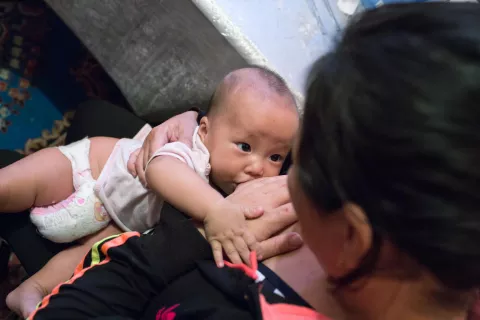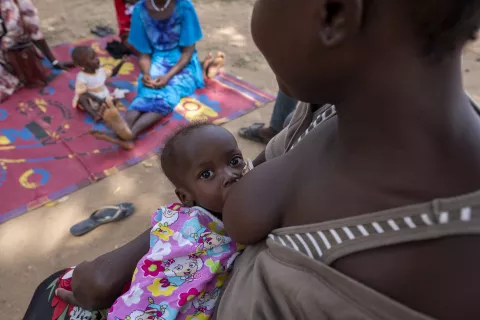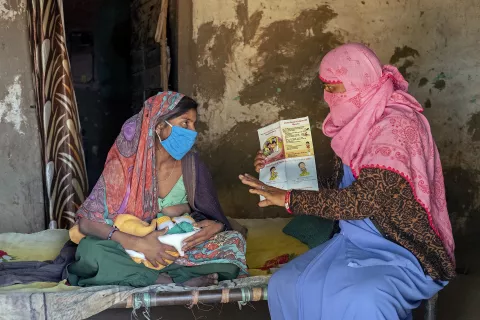States should do more to support and protect breastfeeding, and end inappropriate marketing of breast-milk substitutes
Joint statement by the UN Special Rapporteurs on the Right to Food, Right to Health, the Working Group on Discrimination against Women in law and in practice, and the Committee on the Rights of the Child in support of increased efforts to promote, support
- Available in:
- 中文
- English
Breastfeeding is a human rights issue for both the child and the mother Children have the right to life, survival and development and to the highest attainable standard of health, of which breastfeeding must be considered an integral component, as well as safe and nutritious foods. Women have the right to accurate, unbiased information needed to make an informed choice about breastfeeding. They also have the right to good quality health services, including comprehensive sexual, reproductive and maternal health services. And they have the right to adequate maternity protection in the workplace and to a friendly environment and appropriate conditions in public spaces for breastfeeding which are crucial to ensure successful breastfeeding practices.
As shown by new scientific evidence[i] breastfeeding helps infants and young children survive and thrive. Breast milk in general is safe, clean and contains anti-bodies which help protect against many common childhood illnesses. Increasing breastfeeding to near-universal levels could save more than 820 000 lives each year. Studies have indicated that breastfed children perform better on intelligence tests, are less likely to be obese or overweight, and are less prone to diabetes later in life. In addition, increasing breastfeeding globally would prevent an additional 20 000 cases of breast cancer in women annually.
Nevertheless, in spite of the many benefits of breastfeeding, for both the mother and child, only an estimated 1 in 3 infants under 6 months are exclusively breastfed globally. This rate has seen no improvement in the last two decades[ii] Women who choose to breastfeed often lack the necessary support structures. Gaps in knowledge and skills among healthcare providers often leave women without access to accurate information or support; family, community, and cultural practices and traditions are not necessarily pro-breastfeeding; limited or non-existent maternity protection prevent many women from optimally breastfeeding; and investments to support breastfeeding are often marginal and far from adequate.
In addition, women are exposed to harmful gender stereotypes and taboos regarding natural and biological functions such a breastfeeding, which leads to different forms of discrimination. Stigmatization regarding breastfeeding in public spaces and at workplaces are a major source of concern as it exposes women to unnecessary stress, pressure or intimidation, even in countries where the practice is legally protected. [iii]
Experts warned that another major obstacle to breastfeeding is the misleading marketing of companies for breast milk substitutes, and the lack of corporate accountability for the adverse consequences of such marketing practices. Global sales of breast-milk substitutes total USD 44.8 billion, and they are expected to rise to USD 70.6 billion by 2019.[iv] Aggressive and inappropriate promotion of breast-milk substitutes, and other commercially prepared food products for children from 6 to 36 months that compete with breastfeeding, continue to undermine efforts to improve early and exclusive breastfeeding rates and act as barrier for women to exercise their rights. These marketing practices often negatively affect the choice and ability of mothers to breastfeed their infants optimally, and to enjoy the many health benefits breastfeeding provides. This is particularly harmful when such marketing strategies and practices target untapped markets in developing countries due to the saturation of markets in developed ones.
We remind States of their obligations under relevant international human rights treaties to provide all necessary support and protection to mothers and their infants and young children to facilitate optimal feeding practices. States should take all necessary measures to protect, promote, and support breastfeeding, and end the inappropriate promotion of breast-milk substitutes and other foods intended for infants and young children up to the age of 3 years.
States must recognize that providing the support and protection necessary for women to make informed decisions concerning the optimal nutrition for their infants and young children is a core human rights obligation. Restriction of women's autonomy in making decisions about their own lives leads to violation of women's rights to health and, infringes women's dignity and bodily integrity. States should prevent and protect from discrimination, including exclusion from public space, linked to breastfeeding. In addition, States should ensure that women can benefit from adequate maternity protection in the workplace[v] , including through the promotion of policies that support nursing mothers.
However, in cases where a woman cannot breastfeed or is not willing to do so, even after having been duly informed about the benefits of breastfeeding, access to good quality breast milk substitutes should be regulated and affordable. In addition, in helping women make informed choices about breastfeeding, States and others should be careful not to condemn or judge women who do not want or who cannot breastfeed.
The independent experts also underlined States' obligation to ensure the survival and development of the child by diminishing infant and child mortality and combating disease and malnutrition through the provision of adequate nutritious foods[vi].This, inter alia, requires States to identify risks and protective factors of children's health, nutrition and development, including those related to the health of mothers and the role of parents and other caregivers, so as to develop and implement rights- and evidence-based policies, strategies and interventions. For this, States should identify the needs and challenges of mothers to provide the best possible nutrition for their infants and young children[vii] .Experts reminded that States should work towards introducing and scaling up simple, safe and cost-effective interventions, including the creation of an enabling environment to protect, promote and support breastfeeding practices.
To this end, measures to be adopted by States should foster women's informed decision-making, including through access to objective and accurate information on the benefits of breastfeeding, as well as protection from biased and misleading information through inappropriate marketing practices of manufacturers and distributors of baby food products. The experts welcome the renewed global efforts that are under way to strengthen protection, promotion and support for breastfeeding, and to reduce inappropriate promotion of commercially prepared foods that interfere with optimal feeding for infants and young children.
These efforts include the International Code of Marketing of Breast-milk Substitutes (1981)[viii].as well as subsequent relevant World Health Assembly (WHA) resolutions. The International Code ensures the proper use of breast-milk substitutes, when these are necessary, on the basis of adequate information and through appropriate marketing and distribution, including by prohibiting advertising, provision of free samples, or promotion in health-care facilities.. It also requires all information on artificial feeding to explain the benefits of breastfeeding and the hazards associated with artificial feeding. Another encouraging development is the new WHO Guidance on ending inappropriate promotion of foods for infants and young children[ix] . States are encouraged to make use of these crucial tools to regulate and reduce inappropriate marketing practices by baby food manufacturers and distributors.
However, the experts warned that there are clear signs of the lack of progress made in, and urgent need for, the adoption of effective measures by States to eliminate harmful, inappropriate marketing strategies and practices. Simply too few States have adopted the necessary stringent and comprehensive legal measures- only 39 States have laws enacting all provisions of the Code[x] - and even fewer have put in place robust and sustainable Code monitoring and enforcement mechanisms.
We call upon States to adopt comprehensive and enforceable normative measures to protect babies and mothers from such practices, and fully align with the recommendations contained in the International Code and the aforementioned new WHO Guidance. Adopting such measures must be recognized as part of States' core obligations under the Convention on the Rights of the Child and other relevant UN human rights instruments to respect, protect and fulfil children's right to life, survival and development; their right to safe and nutritious foods, and their right to the enjoyment of the highest attainable standard of health; and to ensure that women's rights are protected from harmful interference by non-State actors, in particular the business sector.
[i] Victora CG, Bahl R, Barros A et al.: Breastfeeding in the 21st century: epidemiology, mechanisms, and lifelong effects. Lancet. 2016;387:475-490.
[ii] WHO, Maternal, newborn, child and adolescent health: Increasing breastfeeding could save 800 000 children and USD 300 billion every year (2016)
[iii] A/HRC/32/44, paras. 67 and 72
[iv] Rollins N, Bhandari N, Hajeebho N et al.: Why invest, and what it will take to improve breastfeeding practices? Lancet. 2016;387:491-504.
[v] Convention on the Elimination of all forms of Discrimination against Women, articles 10(h) and 12; ILO Convention 183
[vi] Convention on the Rights of the Child, article 24.2(a) and (c)
[vii] Convention on the Rights of the Child, article 6
[viii] Available at http://www.who.int/nutrition/netcode/resolutions/en/
[ix] A69/7 29 April 2016, and A69/7 Add.1 13 May 2016
[x] A/71/40775, para. 81
Media contacts
About UNICEF
UNICEF works in some of the world's toughest places, to reach the world's most disadvantaged children. Across 190 countries and territories, we work for every child, everywhere, to build a better world for everyone.
| Visit UNICEF Global website: www.unicef.org Visit UNICEF China website: www.unicef.cn Follow us on Sina Weibo: http://weibo.com/unicefchina Tencent Weibo: http://t.qq.com/unicef Wechat: unicefchina |




